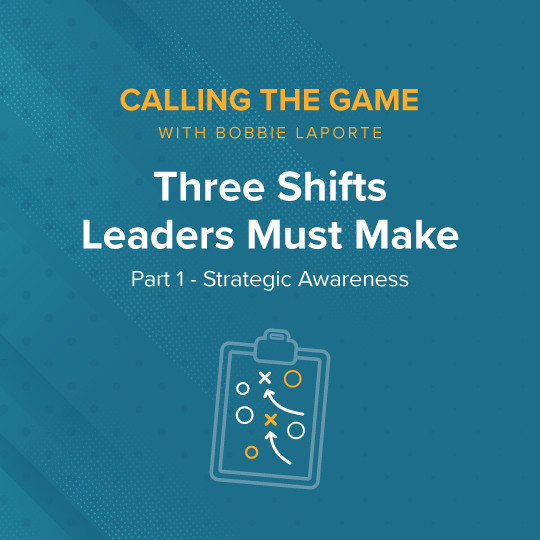We all have a natural tendency to shift into “autopilot” when we’re under a high cognitive load. But as leaders, it’s important to try and fight against this habit—and instead try to move to a state of strategic awareness. Watch Bobbie LaPorte’s March 26 “Calling the Game” video to learn how.
Pause to Go Faster: Breaking Free from Autopilot
Hi, this is Bobbie LaPorte, back with another week of “Calling the Game,” where I share my own experience and insights while giving you valuable tools you can use to call your own game…and plan the best moves for you and your team.
How time flies. It’s been four years since I delivered my TEDx talk, “Curveballs and Blind Spots: Navigating Uncertainty,” in which I discussed our tendency to operate on autopilot—that is, the state where we give into the unconscious, habitual responses that we use to guide the hundreds of decisions and choices we make each day.
Why is being on autopilot an issue?
Because when we are faced with “unrelenting uncertainty” – (and that does seem to be the condition under which we live and lead now, doesn’t it?) – our feelings of competence, confidence and being in control disappear. And the sheer cognitive load that results from attempting to navigate this continuing change and disruption can be overwhelming.
Even very experienced leaders internalize the acute stress of such moments—so much so that their judgment and decision-making skills seem insufficient.
The result? Uncertainty leads to falling back on old habits, which, unfortunately, are almost always out of sync with what the current context demands.
So what can leaders do?
My advice: You must move from autopilot to a state of strategic awareness that enables you to evaluate issues and make no-regret decisions. That means stopping to think and creating space for clear judgment, relevant thinking, and purposeful action.
In other words, pausing to go faster.
One other benefit of this approach is that being on autopilot doesn’t build capacity to deal with future issues. It favors past practices that are no longer relevant and keeps you—and your team—stuck in the past. And autopilot limits choice at a time when having a possibilities mindset is so important.
So the next time a curveball hits, take a few seconds to pause, consider the emergent possibilities available to you in that situation, and then act.
Okay, that’s it for this week’s “Calling the Game.” Hope this helps you gear up for a great week and navigate any curveballs that may come your way!


